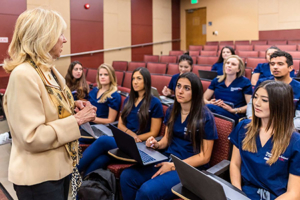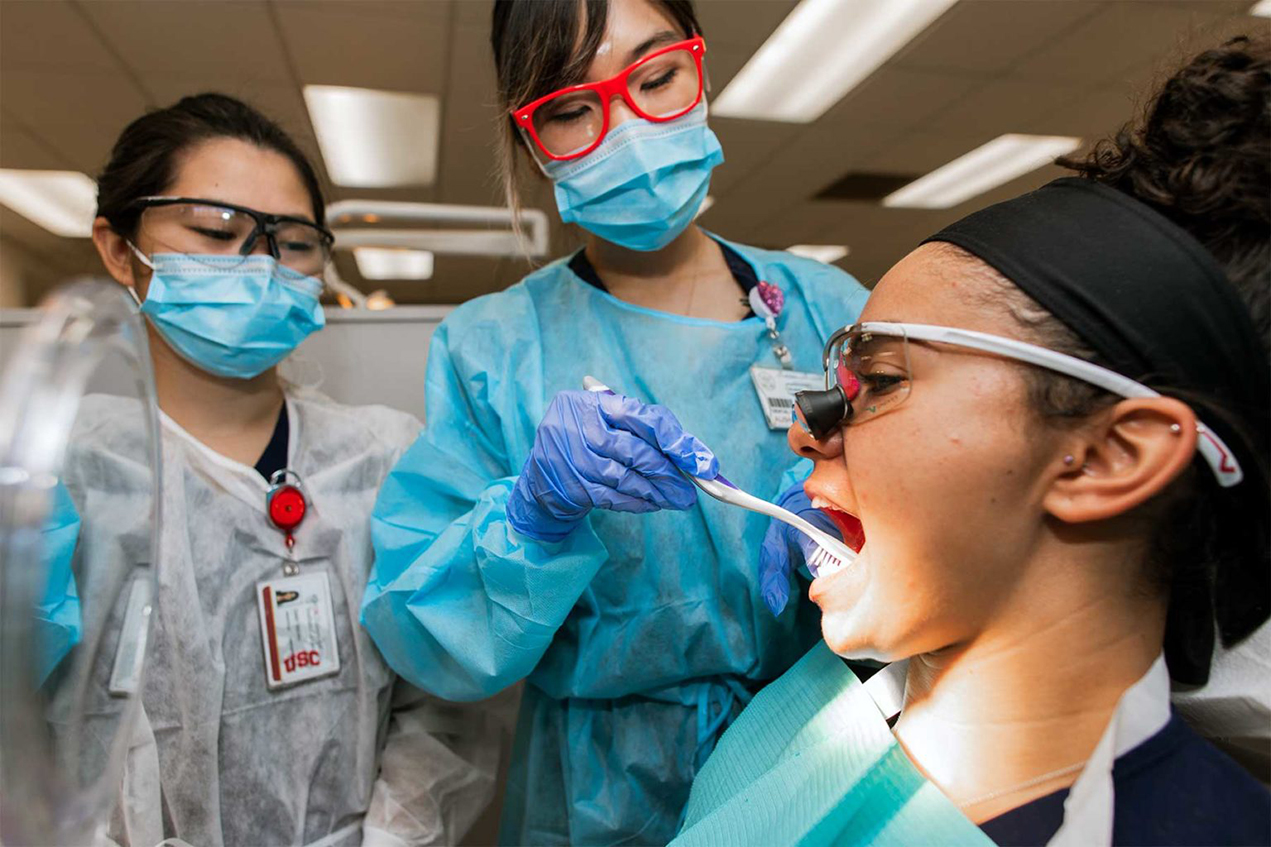The Herman Ostrow School of Dentistry of USC has reshaped its dental hygiene program to focus more on collaboration, adapt to new technology and better prepare graduates for an ever-evolving world.
It’s gone through a number of noteworthy changes. First off, the class is smaller: 20 students comprise the Class of 2021.
“We’re very excited because there’s going to be more personalized education and more one-on-one time between students and faculty,” said Diane Melrose, MA, professor of clinical dentistry and director of the dental hygiene program at the Herman Ostrow School of Dentistry of USC. “The program is clinically the best in the United States, but we’re enhancing it and making it even better than it has been.”
There are 330 accredited dental hygiene programs across the nation, with 27 located in California. Most provide an associate’s degree at a lower cost, but none of them offer students the vast opportunities available at a major university like USC — and only two other dental hygiene programs in California are housed within a dental school.
“We want to emphasize our dental hygiene program’s level of expertise and the advantage we have with it being within the dental school,” Melrose said. “We’re continually collaborating and keeping up with the latest technology in every part of dentistry. Because our students are so involved in communication and explaining things to patients, it’s vital. And they get to have this information firsthand from world-renowned faculty members.”
USC’s dental hygiene faculty are considered experts in the profession and often travel nationally and internationally, teaching the latest techniques and innovations. It is this expertise that sets the USC program aside, giving students face-to-face opportunities to learn from the profession’s thought leaders.
A USC education also gives graduates an advantage when it comes time to look for a job.
“We get so many calls because people know what our program is like, so students have a great network,” Melrose said.
Integration is key for all dental students

Diane Melrose delivers a lecture to dental hygiene students. One of the curriculum changes provides for smaller class sizes, allowing for more personalized, one-on-one education. (Photo/Hannah Benet)
The new model’s goal is to integrate dental hygiene students and dental students, so they are working side by side as they would in a dental office. Dental hygiene and dental students will also take courses and seminars together.
“It’ll be a win-win situation for both the dental students and the dental hygienists, because it’s really important they learn to work together as a team in order to have a successful practice and provide optimal care to the patients,” Melrose said.
The dental hygiene students can teach dental students about scaling, root planing and assessment, while dental students will teach dental hygiene students the different procedures they perform.
“They’ll collaborate and be there with the same patient and work together on assessment,” Melrose said.
The experiences will serve as perfect networking opportunities. Melrose hopes the relationships developed will transition from the classroom into the student’s careers.
“They can learn from each other what their roles are and how they can collaborate and work together when they leave the school,” she said.
There will also be a push for students in the dental hygiene program to collaborate with residents from different specialties at USC, including occupational therapists, pharmacists, physical therapists, physician assistants and social workers. This will better prepare students for the future of the workplace, since that’s where the profession is going.
“When they meet a patient, all the disciplines will be there,” Melrose said. “They’ll collaborate to see what would be the best treatment. The dental hygienist can educate the others in the group about oral care and some other aspects to be aware of. The pharmacists can help with the medications if there’s dry mouth.”
USC’s dental hygiene program: A long history of adaptation
Dental hygiene was added as a certificate program at USC in 1928. The first graduating class consisted of nine women; the class size fluctuated, and by 1996, 53 students were accepted.
The 2018 median salary for dental hygiene is $74,820. Job outlook is expected to grow 20% between 2016 and 2026, much faster than the outlook for other occupations, according to the U.S. Bureau of Labor Statistics.
Whatever transformations occur with the dental hygiene program at USC, the main focus is always on student success. The program has always placed a big emphasis on its students becoming leaders in the field, whether that’s going on to pursue a master’s degree or applying to dental school.
“We want them to develop programs and really advance our profession in different ways, such as through advocacy or creating community programs,” Melrose said. “We are excited about our new model and the opportunity to graduate students who will advance our profession for the future.”
— Michelle McCarthy


